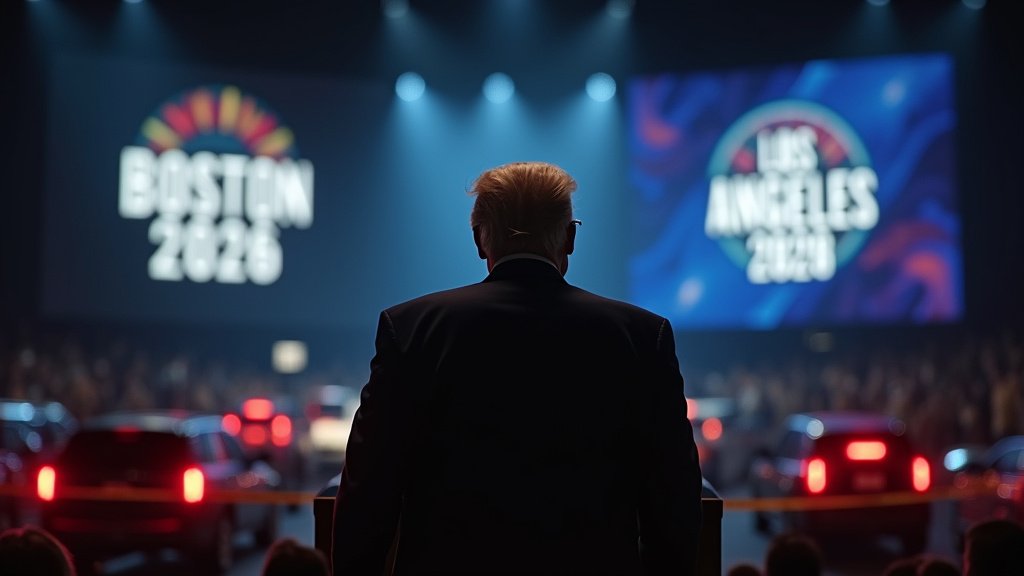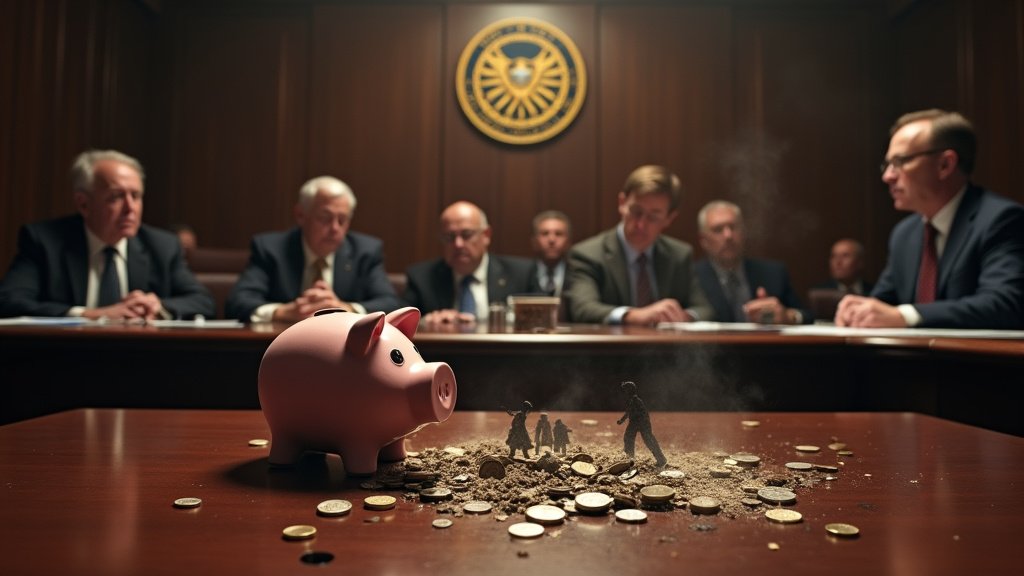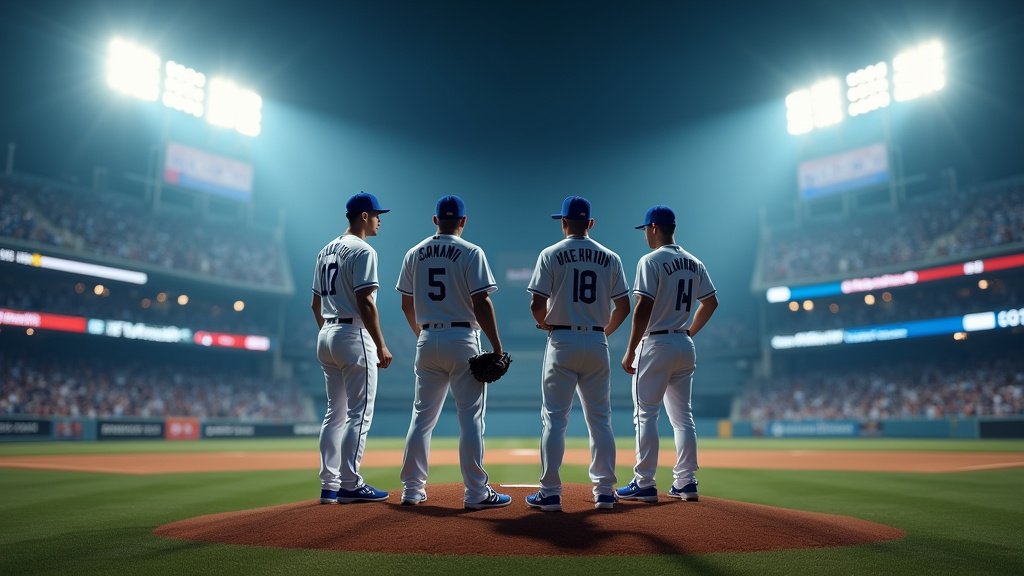Washington D.C. – Former President Donald Trump has issued a stern warning, suggesting that Boston and Los Angeles could lose their opportunities to host major international sporting events – the 2026 FIFA World Cup and the 2028 Olympic Games, respectively – due to escalating crime rates and what he described as the failed policies of Democratic leaders. The current political climate is rife with such pronouncements, making these international events potential flashpoints.
Trump directly criticized Boston Mayor Michelle Wu and California Governor Gavin Newsom, attributing perceived safety issues in their respective regions to their leadership. “Boston better clean up its act. That’s all I can say,” Trump stated, echoing concerns about urban safety that are frequently part of the national news cycle. He specifically threatened to urge FIFA, the international governing body for soccer, to relocate World Cup matches scheduled for the Boston area if unsafe conditions persist. “If somebody is doing a bad job, and if I feel there are unsafe conditions, I would call Gianni [Infantino], the head of FIFA… and I would say, ‘Let’s move it to another location,'” Trump remarked. He asserted that Infantino would comply, stating the move would happen “very easily”.
The 2026 FIFA World Cup is slated to be co-hosted by the United States, Canada, and Mexico, with Boston (specifically Gillette Stadium in Foxborough, Massachusetts) among the 11 U.S. cities selected to host matches. While FIFA has previously indicated that it, not governments, makes decisions regarding host city assignments, Trump’s strong stance underscores his willingness to leverage his influence over international sporting bodies. This is not the first time Trump has raised the possibility of moving World Cup games from cities he deems unsafe, having previously mentioned Seattle and San Francisco.
Turning his attention to the West Coast, Trump also cast doubt on Los Angeles’s ability to host the 2028 Summer Olympics if preparations falter due to safety concerns. He directly addressed Governor Gavin Newsom, stating, “He’s got to get his act together. If he doesn’t play ball, we’re going to have to be very tough with him.” Trump suggested that if Los Angeles was “not going to be prepared properly,” he would “move it to another location”.
Security Preparations Underway Amid Political Warnings
Los Angeles is no stranger to hosting major events, having successfully hosted the Olympics in 1984. For the 2028 Games, significant federal resources and planning are already in motion. The Olympics and Paralympics have been designated a National Special Security Event (NSSE), a status that places the U.S. Secret Service in a lead role for coordinating security operations with federal, state, and local partners. This designation allows for substantial federal funding, with $1 billion allocated for security measures. Former President Trump, during his previous term, had also established a White House task force focused on the security of the 2028 Los Angeles Olympics. Concerns have been raised by civil liberties advocates regarding the potential for increased federal surveillance and law enforcement presence as part of these preparations.
For the 2026 World Cup, the scale of security is equally immense, spanning multiple countries and 16 host cities across North America. The tournament will feature an expanded 48 teams and 104 matches, presenting unprecedented challenges in crowd management, threat analysis, and inter-agency cooperation. U.S. cities preparing to host matches have been advocating for adequate federal funding to ensure public safety, with some reporting delays in receiving promised grants. A previous Trump administration budget had allocated $625 million for World Cup host city security planning.
Crime Trends and the Perception of Safety
Trump’s warnings are framed against a backdrop of ongoing discussions about crime rates in major American cities. While some reports indicate a decrease in certain violent and property crimes in 2024 compared to the previous year, perceptions of safety remain a critical factor for tourism and major event hosting. Research consistently shows that a city’s reputation for safety significantly influences the decisions of potential visitors and event planners. The fear of crime, even if not always statistically validated as rampant, can deter tourists and impact the viability of hosting large-scale international gatherings.
Notably, Boston’s previous bid to host the 2024 Summer Olympics was ultimately withdrawn in 2015 amid declining public support and organizational challenges, not directly due to crime concerns. Its current involvement is strictly as a venue for the 2026 World Cup.
Political Undertones and Future Implications
These latest remarks from the former president highlight a recurring theme: the intersection of politics, public safety, and international events. Trump’s administration has previously been noted for its assertive stance on urban crime and deployments of federal resources, sometimes drawing criticism and legal challenges. His statements serve as a potent political message, aiming to underscore his platform on law and order while potentially creating leverage in current political discourse.
As the clock ticks down to the 2026 World Cup and the 2028 Los Angeles Olympics, the success of these events hinges not only on logistical planning and security but also on broader perceptions of safety and stability. Trump’s warnings, while perhaps politically charged, bring into sharp focus the critical importance of addressing public safety concerns in major urban centers that aspire to host the world on their doorstep. The current news cycle continues to follow these developments closely.





